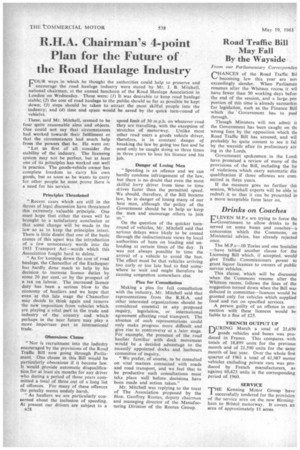R.H.A. Chairman's 4-point Plan for the Future of the Road Haulage Industry
Page 34

If you've noticed an error in this article please click here to report it so we can fix it.
rOUR ways in which he thought the authorities could help to preserve and encourage the road haulage industry were stated by Mr. J. B. Mitchell, national chairman, at the annual luncheon of the Road Haulage Association in London on Wednesday. These were: (/) It was desirable to keep road haulage stable; (2) the cost of road haulage to the public should so far as possible be kept down; (3) steps should be taken to attract the most skilful people into the industry; and (4) time and space would be saved by the quick turn-round of vehicles.
These, said Mr. Mitchell, seemed to be four quite reasonable aims and objects. One could not say that circumstances had worked towards their fulfilment or that the circumstances had much help from the powers that be. He went on: "Let us first of all consider the stability of the industry. The licensing system may not be perfect, but at least one of its principles has worked out well in practice. The goods-vehicle owner has complete freedom to carry his own goods, but as soon as he wants to carry for other people he must prove there is a need for his service.
Principles Threatened "Recent cases which are still in the throes of legal discussion have threatened this extremely valuable principle. One must hope that either the cases will be brought to a satisfactory conclusion or that some change will be made in the law so as to keep the principles intact. There is little doubt that one of the basic causes of this upset was the introduction of a few unnecessary words into the 1953 Transport Act—words which this Association fought hard to delete.
"As for keeping down the cost of road haulage, the Chancellor of the Exchequer has hardly done much to help by his decision to increase licence duties by some 20 per cent. or by the prospect of a tax on labour. The increased licence duty has been a serious blow to the economy of hauliers and we hope that even at this late stage the Chancellor may decide to think again and remove the new imposition from vehicles which are playing a vital part in the trade and industry of the country and which perhaps in the near future may play a more important part in international trade.
Obnoxious Clause "Nor is recruitment into the industry encouraged by the provisions of the Road Traffic Bill now going through Parliament. One clause in this Bill would be particularly obnoxious if it became law. It would provide automatic disqualification for at least six months for any driver who during a period of three years committed a total of three out of a long list of offences. For many of these offences the penalty seems unduly harsh.
"As hauliers we are particularly concerned about the inclusion of speeding. At present our drivers are subject to a n28 speed limit of 30 m.p.h. on whatever road they are travelling, with the exception of stretches of motorway. Unlike most other road users a goods vehicle driver, therefore, is in constant danger of breaking the law by going too fast and he need only be caught doing so three times in three years to lose his licence and his job.
Danger of Losing Men "Speeding is an offence and we can hardly condone infringement of the law, but there is no doubt that even the most skilful lorry driver from time to time drives faster than the permitted speed. We should, therefore, if the Bill became law, be in danger of losing many of our best men, although the policy of the Government should be to help us keep the men and encourage others to join us."
On the question of the quicker turnround of vehicles, Mr. Mitchell said that serious delays were likely to be caused through the indiscriminate views by local authorities of bans on loading and unloading at certain times of the day. It was not always possible to time the arrival of a vehicle to avoid the ban. The effect must be that vehicles arriving too early or too late had to find somewhere to wait and might therefore be causing congestion somewhere else.
Plea for Consultation Making a plea for full consultation with the industry, Mr. Mitchell said that representations from the R.H.A. and other interested organizations should be considered essential in any proposed inquiry, legislation, or international agreement affecting road transport. The absence of such representations could only make progress more difficult and give rise to controversy at a later stage. For example, the presence of the road haulier familiar with dock movement would be a decided advantage to the recently appointed docks and harbours committee of inquiry.
"We prefer, of course, to be consulted on vital matters connected with roads and road transport, and we feel that to be productive such consultations must take place well before decisions have been made and action taken."
Mr. Mitchell was replying to the toast of The Association proposed by the Hon, Geoffrey Rootes, deputy chairman and managing director of the Manufacturing Division of the Rootes Group.




























































































































